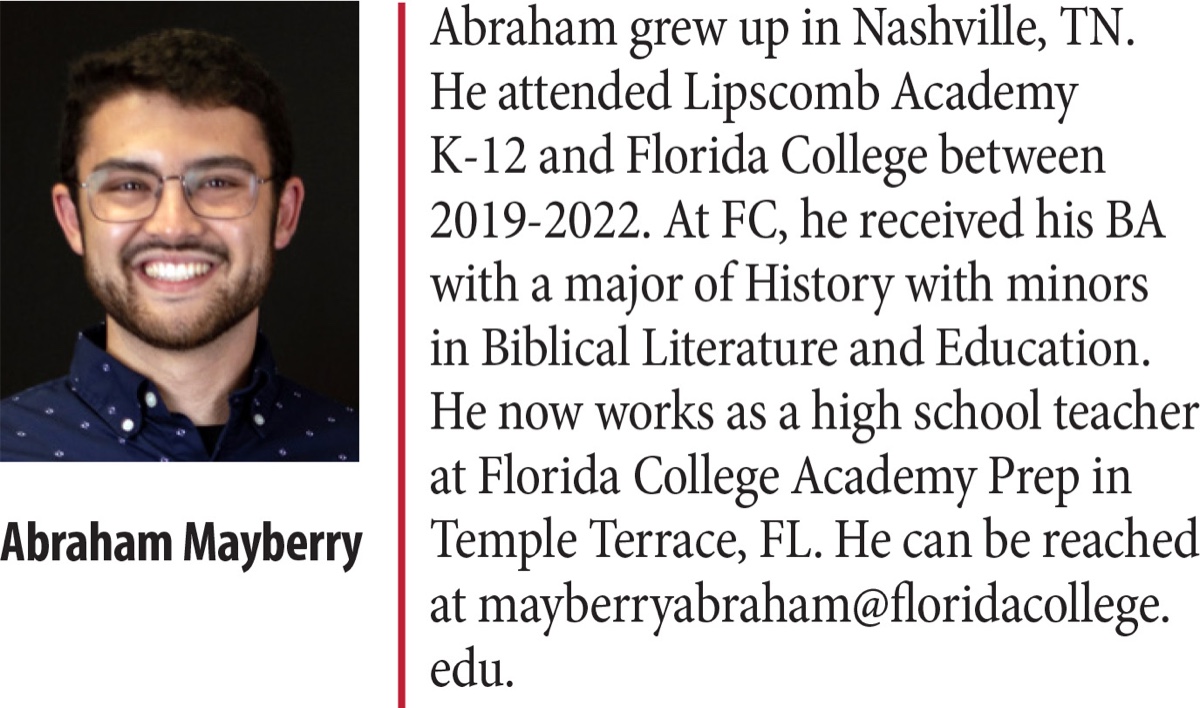By Abraham Mayberry
Synopsis: Through re-prioritization and forming helpful habits, youth can show hospitality and service to both God and their community while they are young.
The idea of waking up early is very unusual for the average college student; I am the opposite. At college, I enjoy my morning routine: going on a run (somedays), brushing my teeth, showering, and then—my favorite part—going to the campus coffee shop. Going to the coffee shop was my favorite part of my morning routine, not just for the coffee, but because that was when I would do my daily Bible reading with a close group of friends. Making the routine of studying the Bible in a community kept me more accountable for reading it daily and forged a daily habit.
Whether drinking coffee, driving the same morning commute to work, or nightly routine, we are all people of habit, practices, and patterns. As Christians, we can apply our nature of creating habits to our spiritual service to God and others. Jesus gave us our mission in this world to love God and love others (Matt. 22:37-40). One aspect of this is our hospitality and giving. Some youth often struggle with finding ways to serve at a young age and often relax their generosity and service. Creating habits of generosity and giving is crucial to the walk of a Christian at any age.
Back in high school, there was an old poster in a classroom with a quote, “Watch your thoughts, they become your words; watch your words, they become your actions; watch your actions, they become your habits; watch your habits, they become your character; watch your character, it becomes your destiny.” Our Bibles record, in a letter from Paul to Timothy, a young disciple of Christ, to “Let no one despise you for your youth, but set the believers an example in speech, in conduct, in love, in faith, in purity” (1 Tim. 4:12). Both quotes agree—the time is now to form helpful practices!
Even if we are young, we must begin making habits of charity to God and hospitality to others today. We cannot put this off till we are older. We can become the person we want to be by the habits we start when we are young. This change does not happen overnight but begins with studying the Scripture, prayerful meditation, and creativity in thinking about how we can serve in whatever circumstance or stage of life we find ourselves.
First, we must study the message of Haggai—one prophet in our Bibles. Before Haggai, God sent His people into Babylonian captivity because of their sins that had built up over many years. Eventually, Babylon fell, and under the new rule of the Persians, some of God’s people had the opportunity to return to the land. The post-exilic community of God’s people needed a reminder on how to renew their lives and work for God. This was not just about them returning to the land, but returning to God.
Around August 520 BC, the prophet Haggai delivered a message from the Lord to Zerubbabel (the governor of Judah) and Joshua (the high priest). The people neglected the work of the Lord and needed to get back to work. Haggai spoke, “Thus says the LORD of hosts: These people say the time has not yet come to rebuild the house of the LORD. . . Is it a time for you yourselves to dwell in your paneled houses while this house lies in ruins?” (Hag. 1:2, 4). Then God challenged, saying,
Consider your ways. Go up to the hills and bring wood and build the house, that I may take pleasure in it and that I may be glorified, says the LORD. You looked for much, and behold, it came to little. And when you brought it home, I blew it away. Why? Declares the LORD of hosts. Because of my house that lies in ruins, while each of you busies himself with his own house (Hag. 1:7-10).
God’s message challenged the people to resume their work by condemning the people for putting their interests before God’s by building their own homes first before the temple. The people do not believe it was the right time to build the house of the LORD, but God calls them out by saying they had enough time to build their own homes.
The term “paneled” describing their houses probably references the inside of wealthier homes (Fuhr and Yates, 258-259). This term is referenced in the temple and royal palace (1 Kings 6:9; 7:3, 7). During the rule of King David, he wept that he lived in a cedar house while God’s house was in a tent. It was the opposite for the audience of Haggai’s message. David’s heart contrasts with the people here. God and the temple should have taken priority in their lives, but the people focused on themselves first.
The people needed to refocus their priorities and return to the Lord’s work. In response, we read that God’s remnant people listened and obeyed God. God’s response to the people’s intention and change of heart was, “I am with you, declares the LORD” (Hag. 1:13b).
Applying this message to our lives, I ask—What is our focus? If we have money, do we use it first for ourselves or God and others? We have a similar calling today, and the time to work and serve is now. We must honestly look at our priorities and assess our lives. While we are young, we must begin practicing hospitality and generosity to God and others, even if we do not own a home. There are many ways our generosity and hospitality can be accomplished, with or without money. When planning how to achieve this task, an excellent first step is to take the time and effort to prepare.
For the work of the church, we can use a portion of our money from our job to give to the Lord’s work with the church. This might mean sacrificing the five coffees we buy and using that money to give back to the church. Any amount you can give is pleasing to God, and sometimes it might just be a couple of dollars, while other times more. If you do not have the money at times, there are ways to give back without it. You can help teach or co-teach a Bible class, write cards to shut-ins, or even volunteer to clean the building on a Saturday. The importance is to start now and not put it off till later in life because life seems only to get busier.
Another important aspect of giving in the life of a Christian outside of the church is helping our community. Supporting our community is not done through the church treasury but individually in a Christian’s life. Sometimes this part of giving is too relaxed and is often forgotten because it is less structured than giving back to the church. We must find creative and practical ways we can serve the community individually. When budgeting for giving to the church’s work, we can also budget for our individual service and giving to others. It is vital that we don’t let either giving slack off. Money set aside for the community could be used to purchase Bibles, restaurant gift cards, or care packages with essential items for the homeless. It could mean personally donating money for adoptions, clothes/shoes to a donation drive, or volunteering at a local food kitchen. To live a life of generosity requires self-sacrifice and thoughtful consideration of how best to practice these things scripturally and effectively.
Let us remember Paul’s encouragement to the Philippian church, “Let each of you look not only at his own interests but also the interests of others” (Phil. 2:4). Re-prioritizing our life of service with a humble and hospitable heart is pleasing to God. It begins with small steps in the present. Let us not just have habits of daily morning coffee but also habits in our service to our God and others.
All Scriptures are quoted from the English Standard Version (ESV). Wheaton, IL: Crossway Bibles, 2016.
Fuhr Jr., Richard Alan, and Gary E. Yates. The Message of the Twelve: Hearing the Voice of the Minor Prophets. Nashville, TN: B&H Academic, 2016.


